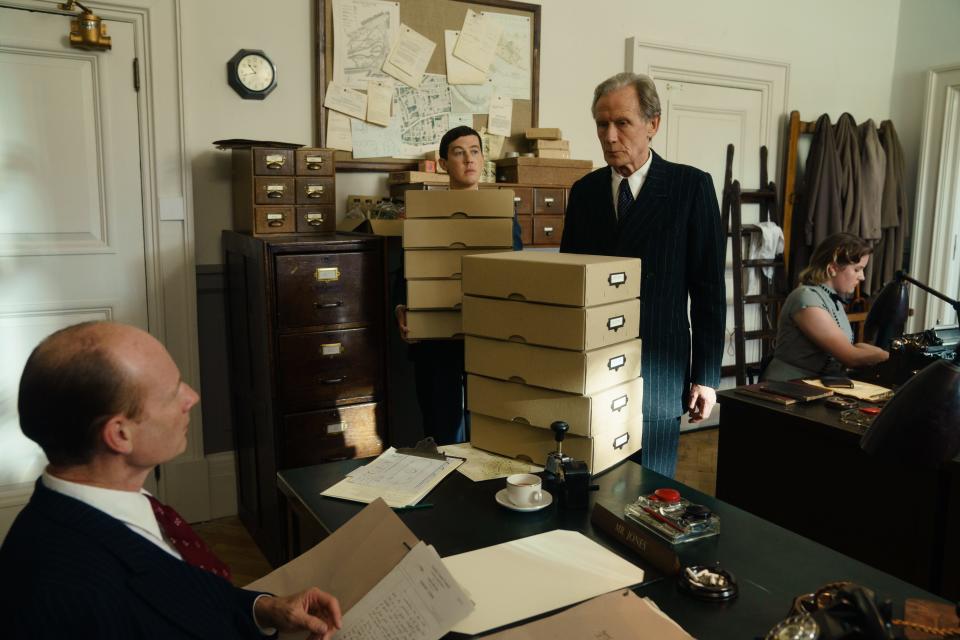Already a knight and a Nobel winner, will this writer's latest film win him an Oscar?
- Oops!Something went wrong.Please try again later.
- Oops!Something went wrong.Please try again later.
- Oops!Something went wrong.Please try again later.
Kazuo Ishiguro has been working toward “Living” for most of his life.
Ishiguro — a novelist whose contributions to literature have earned him the Nobel Prize, the Booker Prize and a knighthood — is now an Academy Award nominee thanks to his screenplay for “Living,” an adaptation of Akira Kurosawa’s classic 1952 film “Ikiru.”
The story of both Kurosawa’s “Ikiru” and Ishiguro’s “Living” concerns a mild-mannered civil servant in the early 1950s, tasked with deciding what to do with his few remaining days after learning he has terminal cancer.
Born in Nagasaki, Japan, in 1954, Ishiguro moved to Britain with his parents when he was 5. He first saw “Ikiru” at his mother’s insistence around the age of 12. It was only when penning the screenplay for “Living” that he came to fully realize how much the film influenced not just his career, but his life.

“That film helped shape a lot of my ideas,” Ishiguro said. “I think the big thing it said to me at the time was that you could have a fairly ordinary, small life, maybe a humble life, (but) with some effort ... it’s possible to find a way to turn even a small, even ordinary life ... into something magnificent and heroic.”
Growing up, Ishiguro spent seven years sharing a commuter train with adults making their way to their London offices, the same bowler hat-wearing sort who populate “Living.”
“They don’t wear bowler hats anymore, but it’s still much the same,” Ishiguro said. “And I thought when I got to a certain age I would join their ranks. So watching ‘Ikiru,’ although it’s set in a Japanese office with bureaucrats, I kind of thought that’s what adult working life was going to be like.”

Instead Ishiguro, now 68, became one of the most heralded authors of his generation. And the key themes of “Ikiru,” concerning one’s relationships with their occupation and their sense of mortality, manifested in some of his most acclaimed work.
“It’s there in a lot of my books,” he said. “‘Remains of the Day’ (1989), ‘Never Let Me Go’ (2005). I think there’s a lot of ‘Ikiru’ in that.”
‘It was just a big dream’
“Living” earned a pair of Academy Award nominations for Sony Pictures Classics, where the co-founder and co-president is Tom Bernard of Middletown. In addition to Ishiguro’s recognition in the Best Adapted Screenplay category, star Bill Nighy is in the running for Best Actor.

Ishiguro previously wrote the screenplay for 2005’s “The White Countess” for the studio, which also won Adapted Screenplay Oscars for films such as “Call Me By Your Name” (2017) and the first Sony Classics film, “Howard’s End” (1992).
The recognition from the Academy for “Living,” Ishiguro said, is “absolutely amazing.”
“It’s a kind of small, independent British film, that’s how it started,” he said. “I’m not a regular screenwriter, so it was just a big dream, a fantasy dream of mine that we could do such a project.”

With “Living,” Ishiguro manages a wonderful act of transplantation. “Ikiru” was, among many things, about how a post-war city struggles to repair itself one piece of land at a time, rising from the rubble in spite of a bureaucratic structure seemingly built to make that process as difficult as possible. “Living” empathetically shows how that was the case on both sides of the war, with plenty of lingering trauma and uncertainly in both Britain and Japan.
“I always thought (the Kurosawa film) works beautifully in the post-war Japanese setting," Ishiguro said, "but I thought there was ... a new movie, a whole new work of art (that) could be created if you married that material with a lot of the stuff about Englishness and that kind of English restraint — and you might even call it English inhibition."
Ishiguro makes some bold decisions in adapting Kurosawa’s work. It’s more than 40 minutes shorter than the original, with structural and character changes that give it an overall more optimistic tone.

It’s a similar tactic that Kurosawa himself employed when adapting England’s most iconic wordsmith, William Shakespeare. So, naturally, Ishiguro took his artistic cues from Kurosawa when it came to “Living.”
“Don’t be afraid to adapt or take things from the very best that has been … because that’s what you want to take in and give to other people, pass on,” he said. “... I think the message there is that you do have to be ruthless. There’s no time to be reverential. You take what you can from whoever, however great they are. You take what you can and you have to try to create your own artistic vision.”
Go: “Living,” now playing in select theaters, tickets.living-movie.com.
This article originally appeared on Asbury Park Press: Oscars: Kurosawa remake by Kazuo Ishiguro up for Academy Award

